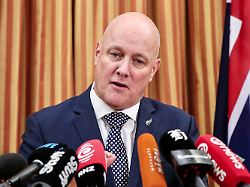New election result
New Zealand’s conservatives can’t create a majority
November 3rd, 2023, 4:40 a.m
Listen to article
This audio version was artificially generated. More info | Send feedback
When the official election results were announced, multimillionaire Christopher Luxon experienced a nasty surprise: the wafer-thin majority in parliament was wiped out by voters who voted outside their constituency. Now there is a risk of a complicated alliance with populists.
Three weeks after the parliamentary election in New Zealand, the majority changed surprisingly again with the announcement of the official results. The conservative alliance of the National Party of multimillionaire Christopher Luxon and the right-wing liberals is now unable to achieve the required majority of votes, as the national electoral commission announced.
The Pacific state had been governed by the social democratic Labor Party for the past six years, which was not dependent on any coalition partner during this time. The day after the election, it still looked as if Luxon’s party would get 50 of 120 seats in parliament and the right-wing liberal ACT would get 11 – which together would have been enough for a wafer-thin majority. But the “special votes” from voters who voted outside their constituency still had to be counted. And this time, that was almost 21 percent of all 2.9 million votes cast, as the electoral commission now announced – significantly more than in the previous elections.
According to the final count now available, there will be 123 MPs, of which 11 will still be from the ACT, but only 48 from the National Party. Luxon’s conservatives could therefore find themselves forced to enter into a difficult alliance with the populist New Zealand First party, which initially did not seem necessary.
The National Party particularly scored points in the election campaign with promises of tax cuts, while New Zealand First particularly attracted attention with slogans against immigrants. The Labor Party of the previously ruling Labor Prime Minister Chris Hipkins, who has already admitted his defeat and wants to continue as opposition leader, remains behind: it still only has 34 seats – and has therefore lost almost half of the previous mandates. Hipkins only became prime minister in January after his world-famous predecessor Jacinda Ardern unexpectedly resigned from office.
